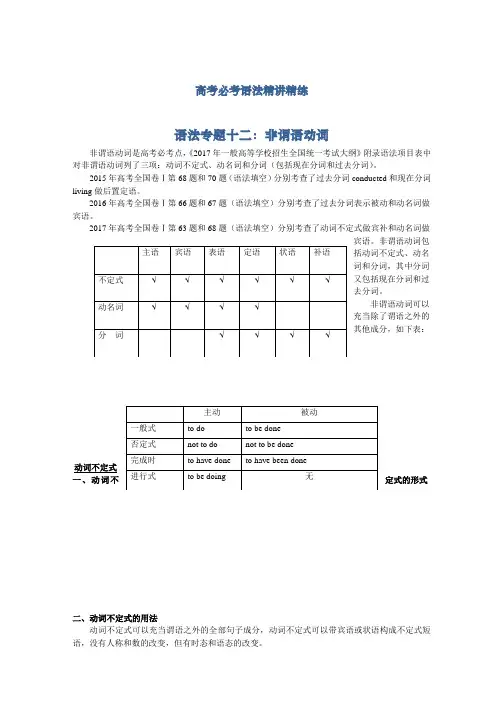第十二讲 非谓语动词
- 格式:doc
- 大小:66.50 KB
- 文档页数:7


高考必考语法精讲精练语法专题十二:非谓语动词非谓语动词是高考必考点,《2017年一般高等学校招生全国统一考试大纲》附录语法项目表中对非谓语动词列了三项:动词不定式、动名词和分词(包括现在分词和过去分词)。
动词不定式一、动词不定式的形式二、动词不定式的用法动词不定式可以充当谓语之外的全部句子成分,动词不定式可以带宾语或状语构成不定式短语,没有人称和数的改变,但有时态和语态的改变。
1.作主语(1)动词不定式作主语,一般表示详细的某次动作,谓语动词用单数形式。
例如:①To see is to believe.②To master English is of great importance.(2)不定式或不定式短语作主语时,常用it作形式主语,构成“It is + adj+for sb.+to do”结构,或It is +adj+for sth +to be done。
例如:①It is impossible for him to give up smoking.②It is not easy to find your way in the mountain.③It is difficult for the problem to be solved.④It is impossible for my question to be answered in his absence.2.作宾语(1)动词不定式作宾语时,常跟在某些及物动词后面,常见的有:agree,dare,decide,expect,help,hope,learn,manage,offer,pretend,promise,refuse,want, intend, fail, wish, choose等。
例如:①I mean to go there at once.②We must learn to tell friends from enemies.(2)不定式短语作宾语时,假如还带有宾语补足语,往往把不定式短语放在宾补之后,而用it 作形式宾语。









非谓语动词t h e N o n-F i n i t e V e r b s 定义在句子中不是谓语的动词,形式:不定式、动名词和分词现在分词和过去分词作用:在句子中充当主语、宾语、状语等.特点:1.非谓语动词可以有名词作用如动词不定式和动名词,在句中做主语、宾语、表语.2.非谓语动词可以有形容词作用如动词不定式和分词,在句中做定语、表语或宾语补足语.3.非谓语动词可以有副词作用如动词不定式和分词,在句中作状语.4.谓语动词在句中作谓语,受主语的人称和数的限制;非谓语动词在句中不能单独作谓语,它不受主语的人称和数的限制.5.英语中不能单独做句子的谓语.与谓语动词的关系相同点(1)如果是及物动词都可与宾语连用,例如: They built a garden. They suggested building a garden.(2)都可以被状语修饰: The suit fits him very well. The suit used to fit him very well.(3)都有主动与被动, “体”式一般式;进行式;完成式的变化.例如:He was punished by his parents.谓语动词被动语态 He avoided being punished by his parents.动名词的被动式We have written the composition.谓语动词的完成时 Having written the composition, we handed it in.现在分词的完成式(4)都可以有逻辑主语They started the work at once.谓语动词的逻辑主语 The boss ordered them to start the work.动词不定式的逻辑主语We are League members.谓语动词的主语 We being League member, the work was well done. 现在分词的逻辑主语不定式一、形式功能:动词不定式:to+do,具有名词、形容词、副词的特征.否定式:not + to do 以do为例,动词不定式的构成如下:(1)一般式:不定式的一般式所表示的动作与谓语动词动作同时发生或发生在谓语动词动作之后.例如: I'm nice to meet you. 很高兴见到你.He seems to know a lot. 他看起来懂得很多.We plan to pay a visit. 我们计划花钱去参观.He wants to be an artist. 他想成为一个艺术家.The patient asked to be operated on at once. 病人要求马上手术.The teacher ordered the work to be done. 老师要求完成工作.(2)进行式:不定式的进行式所表示的动作与谓语动词动作同时发生,例如:The boy pretended to be working hard. 男孩假装工作得很努力.He seems to be reading in his room. 看起来他正在他的房间里面读书.3完成式:不定式的完成式表示的动作发生在谓语动词动作之前,例如:I regretted having told a lie. 我后悔我说谎了.I happened to have seen the film. 我偶然看过这部电影.He is pleased to have met his friend. 他很高兴能遇上他的朋友.二、不定式的句法功能:(1)作主语:To finish the work in ten minutes is very hard. 十分钟之内完成这项工作是很难的.To lose your heart means failure. 灰心意味着失败.动词不定式短语作主语时,常用it作形式主语,真正的主语不定式置于句后,例如上面两句可用如下形式:It is very hard to finish the work in ten minutes. 十分钟之内完成这项工作是很难的.It means failure to lose your heart. 灰心意味着失败.常用句式有:1作主语:1、It+be+名词+to do.2、It takes sb.+some time+to do.3、It+be+形容词+of sb +to do.①与careless,clever,good,foolish,honest,kind,lazy,nice,right,silly,stupid,wis e,wrong , careful , polite , 等表示赞扬或批评的形容词连用,不定式前的sb.可作其逻辑主语.②与for连用的通常是一些表示可能性、难易程度、必要性等含义的形容词:possible,impossible,easy,hard,difficult,necessaryIt’s necessary for you to study hard .necessary 修饰 to study hard,表示学习努力是有必要的It’s foolish of him to do it .foolish 修饰逻辑主语him2作表语:放be动词后,构成表语Her job is to clean the hall. 她的工作是打扫大厅.He appears to have caught a cold. 他似乎感冒了.注意:(3)作宾语:①动词+不定式.如:He managed to escape from the fire.I find it hard to get along with him.it 作形式宾语下列动词通常用不定式作宾语:want, hope, wish, offer, fail, plan, learn, pretend, refuse, manage, help, promise, prefer, like , begin , try , need , forget , agree , know , teach , help , arrange , dare , decide , determine , prepare , continue , ask , mean , choose , expect ,choose, get等②动词+疑问词+to , “特殊疑问句+不定式”相当于名词,作宾语.如:I don’t know what to do next/ how to do it next.I can’t decide when to go there.注意:不定式短语作宾语时,如果还带有宾语补足语,往往把不定式短语放在宾语补足语之后,用it 作形式宾语.如:I find it necessary to learn a foreign language.We think it important to obey the laws .不定式动词可充当介词宾语,如:I have no choice but to stay here. 我只能留在这里,别无选择.He did nothing last Sunday but repair his bike. 他上周日除了修他的自行车什么也没干.Marx found it important to study the situation in Russia. 马克思发现研究俄国的情况是很重要的.(4)作宾语补足语:①动词+宾语+不定式to doHe warned me to be careful.I want you to speak to Tom.What makes you think so不带to的不定式注:可以用动词不定式做宾补的动词有:ask, tell, order ,want ,get, would like, like, advise, invite, allow, help, wish,warn, expect, prefer, encourage,beg, permit, persuade,prepare, cause, force, call on, wait for, invite.此外,介词有时也与这种复合宾语连用,如:With a lot of work to do, he didn't go to the cinema.他有很多工作要做,所以没去电影院.②表见解、看法的动词结构可为:动词+宾语+ to be 的不定式结构:We consider Tom to be one of the best students in our class.The book is believed to be useful.被动语态③ There +不定式We didn’t expect there to be so many people there.我们没料到会有那么多人在那里.注意:1有些动词需用 as 短语作补语,像regard, think, believe, take, consider.如:We regard Tom as our best teacher. 我们认为汤姆是我们最好的老师.Mary took him as her father. 玛丽把他当作自己的父亲.2在动词feel 一感,hear, listen to二听,have, let, make三让,notice, see, watch, observe, look at五看即:吾看三室两厅一感觉等后面的补足语中,不定式不带to,但变为被动语态后,必须带to.如:They saw the boy fall off the tree. The boy was seen to fall off the tree.3help后面作宾语补足语的不定式可以带to,也可以不带to.I often help him toclean the room.(5)作定语:动词不定式作定语,放在所修饰的名词或代词后.与所修饰名词有如下关系:1)He is looking for a room to live in.动状关系He has got a chance to go abroad.同位关系3主谓关系:She is always the last person to speak at the meeting . ----I’mgoing to the post office , for I have a letter to post .逻辑主语是I -------Thank you. But I have no letters to be posted now 逻辑主语不是I4动宾关系:I have a meeting to attend. 我有一个会议要出席.注意:如果作定语的不定式是一个短语,则要保留不定式短语中的副词或介词.如:I need a pen to write with . I will wirte with the pen 我需要一直钢笔写字I have a little baby to look after .I must look after the little baby 我有一个婴儿要照看He is looking for a room to live He is looking for a room to live in .What did you open it with 你用什么打开它如果不定式修饰time, place, way,可以省略介词:He has no place to live. 他无处安身.This is the best way to work out this problem. 这是解决这个问题的最好办法.He has no money and no place to live in .I think the best way to travel by is on foot .There is no time to think about .注意:①不定式的逻辑主语是句子的主语时,不定式用主动形式表被动、也可用被动式:Have you got anything to send 你要送什么东西吗 Have you got anything to be sent 你有什么东西需要送吗②说明所修饰名词的内容: We have made a plan to finish the work. 我们制定了一个完成工作的计划.③被修饰名词是不定式逻辑主语: He is the first to get here. 他第一个来到这儿.6作状语:①表目的:He worked day and night to get the money. 他夜以继日地工作来赚钱.She sold her hair to buy the watch chain. 她卖掉了自己的头发来买那条表链.注意不定式放句首时,逻辑主语与句子主语要一致: wrong:To save money, every means has been tried. right:To save money, he has tried every means. 为了省钱,他使出了浑身解数. wrong:To learn English well, a dictionary is needed. right:To learn English well, he needs a dictionary. 为了学好英语,他需要一本词典.作目的状语:既可以放在句首,也可以放在句尾 To tell you the truth, I don't like the way he talked. 说实话,我不喜欢他讲话的方式.②表结果往往是与预期愿望相反的结果意料之外:常放在never only后He arrived late only to find the train had gone. 他来晚了,只见火车已经走了.I visited him only to find him out. 我去拜访他,只见他出去了.③表原因:常放在形容词后面They were very sad to hear the news. 他们听到这条新闻非常伤心.④表程度:It's too dark for us to see anything. 太暗了,我们什么也看不见.The question is simple for him to answer. 这问题由他来回答是很简单的.三、不定式的省略:①情态动词除ought外, ought to do②would rather, had better③感官动词和使役动词④由 and, or 和 than 连接的两个不定式,第二个 to 可以省去.如:He wants to move to France and marry the girl.⑤help⑥Why…/Why not…⑦But 和 except 前是动词 do 时,后面出现的动词用不带 to 的动词不定式.试比较:He wants to do nothing but go out.He wants to believe anything but to take the medicine.⑧通常在discover, imagine, suppose, think, understand 等词后,可以省去 to be .如:⑨保留to省略do动词. If you don't want to do it, you don't need to. 如果你不想做这件事,你就不必做.⑩不定式的并列:第二个不定式可省略to.下列短语中,如果意义明确,常常省略到to:want to , wish to ,hope to , like to , hate to , plan to , try to , love to , have to , ought to , need to , used to , be able toHe wished to study medicine and become a doctor. 他希望学医并成为医生.五、注意:1.to 作介词:agree to, object to,close to , come to , lead to , refer to , equal to , familiar to , point to , thank to , devote to , next to , belong to , be used to , look forward to动名词一、定义:动名词既具有动词的一些特征,又具有名词的句法功能.二、形式:一般式 doing 谓语动词同时发生 being done Seeing is believing. 眼见为实.完成式 having done having been done 谓语动词发生之前We remembered having seen the film. 我们记得看过这部电影.否定式:not + 动名词动名词的形式: I regret not following his advice. 我后悔没听他的劝告.被动式: He came to the party without being invited.他未被邀请就来到了晚会.完成被动式: He forgot having been taken to Guangzhou when he was five years old. 他忘记五岁时曾被带到广州去过.复合结构:物主代词或名词所有格+ 动名词He suggested our trying it once again. 他建议我们再试一次.His not knowing English troubled him a lot. 他不懂英语给他带来许多麻烦.三、动名词的句法功能:(1)作主语:谓语用单数Reading aloud is very helpful.Collecting stamps is interesting.Playing with fire is dangerous.当动名词短语作主语时常用it作形式主语.结构:It’s no good/use doing.... It's no use quarrelling.争吵是没用的.(2)作表语:动名词可以和主语调换位置.如:My hobby is collecting stamps.In the ant city, the queen's job is laying eggs. 在蚂蚁王国,蚁后的工作是产卵.3作宾语:They haven't finished building the dam. 他们还没有建好大坝.We have to prevent the air from being polluted. 我们必须阻止空气被污染.注意动名词既可作动词宾语也可作介词宾语,如上面两个例句.此外,动名词作宾语时,若跟有宾语补足语,则常用形式宾语it,例如: We found it no good making funof others. 我们发现取笑他人不好.只接V-ing做宾语的动词和动词短语:enjoy, finish, suggest, avoid, excuse ,delay, imagine, keep, miss, consider, admit,deny, mind, permit, forbid, practise, risk, appreciate, be busy, be worth, feel like, can't stand, can't help, think of, dream of, be fond of, prevent…from,keep …from, stop…from,protect…from, set about, be engag ed in, spend…in, succeed in, be used to, look forward to, object to, pay attention to, insist on, feel like接动名词、不定式均可,且意义相同的动词:like, love, dilike,hate, begin, star, continue, prefer, cease, can’t bear/endure/stand接动名词、不定式均可,但意义不同的词:forget,go on,mean,regret,remember,stop,try等Stop to do 停下来去做 stop doing 停止做Forget to do 忘记要做 forget doing 忘记做过Remember to do 记得要做 remember doing 记得做过Regret to do 遗憾要做 regret doing 后悔做过Try to do 企图做,尽力做 try doing 试着做Go on to do 继续做另一件事 go on doing 继续做同一件事Mean to do 打算做 mean doing 意味做注意:Need, require, want作“需要”讲,其后用动名词的主动式表示被动意义,be worth也有类似用法.如:The flowers need watering/to be watered.The problem is worth discussing.(4)作定语:动名词作定语,一般表示用途.如:a waiting room,a diving board,a reading room,a dining hall动名词与现在分词作定语的区别:1现在分词作定语表动作,它与所修饰的名词之间存在逻辑上的主谓关系,可改写成一个定语从句.如果为单词,放在被修饰n之前,为短语,放在被修饰n之后.如:a sleeping boy =a boy who is sleepinga developing country =a country which is developing2动名词作定语通常表示它所修饰的名词的用途或性质,可改写成一个for的短语,两者不存在逻辑上的主谓关系.如:a washing machine = a mashine for washinga swimming pool = a pool for swimmingHe can't walk without a walking-stick. 他没有拐杖不能走路.Is there a swimming pool in your school 你们学校有游泳池吗(5)作同位语: The cave, his hiding-place is secret. 那个山洞,他藏身的地方很秘密.His habit, listening to the news on the radio remains unchanged.他收听收音机新闻节目的习惯仍未改变.分词一、现在分词和过去分词的区别:1在语态上,现在分词表示主动意义;过去分词表示被动意义,不及物动词的过去分词表示动作已经发生.像:gone, fallen, retired, grown-up, escaped, faded, returned等词.如:a retired person 一个退休的人 a fallen ball 一个落下来的球2在时间上,现在分词表示的动作往往正在进行或者与谓语动词同时发生,过去分词表示的动作已经完成或没有一定的时间性.如:falling leaves 正在下落的树叶 fallen leaves 已经落在地上的树叶注意:分词作时间状语,如果先于主动词的动作,且强调先后,要用having done.如:Having finished his homework, he went out for a walk.=After he had finished his homework, he went out for a walk.二、注意:1分词作状语,其逻辑主语要与主句主语保持一致2分词前常有when / while / as / before/ after/ if / unless /even if 等引导词3如果过去分词的动作发生在主句谓语之前,用having been done Having been hurt in a traffic accident, I was given an operation.4分词做状语,主语之前不可有and /but / so / or/ so that 等连词如有,则此句子为祈使句Working hard, you will succeed.Working hard and you will succeed.5)否定式,在分词之前+ not6)固定搭配: be dressed in be lost in thoughts lost in thoughts, he knocked into me.7)分词的逻辑主语与主句不同,分词要有自己的逻辑主语,称为“独立主语” The money used up, I had no food to eat现在分词二、定义:既具有动词的一些特征,又具有形容词和副词的句法功能.二、形式:肯定式:V-ing;否定式:not + 现在分词(1)主动语态:现在分词主动语态的一般式表示与谓语动词所表示的动作同时发生,完成式表示的动作在谓语动词所表示的动作之前发生,常作状语.例如:They went to the park, singing and talking. 他们边唱边说向公园走去.Having done his homework, he played basket-ball. 做完作业,他开始打篮球.(2)被动语态:一般式表示与谓语动词同时发生的被动的动作,完成式表示发生在谓语动词之前的被动的动作.The problem being discussed is very important. 正在被讨论的问题很重要.Having been told many times, the naughty boy made the same mistake. 被告诉了好几遍,这个淘气的孩子又犯了同一个错误.三、现在分词的句法功能:(1)作定语:现在分词作定语,当分词单独做定语时,放在所修饰的名词前;如果是分词短语做定语放在名词后.In the following years he worked even harder. 在后来的几年中,他学习更努力了.The man speaking to the teacher is our monitor's father. 正与老师谈话的那个人是我们班长的父亲.现在分词作定语相当于一个定语从句的句法功能,如:in the following years也可用in the years that followed; the man speaking to the teacher可改为the man who is speaking to the teacher.(2)现在分词作表语: The film being shown in the cinema is exciting. 正在这家上演的电影很棒.The present situation is inspiring. 当前的形势鼓舞人心.be + doing既可能表示现在进行时,也可能是现在分词做表语,它们的区别在于be + doing表示进行的动作是进行时,而表示特征时是系动词be与现在分词构成系表结构.3作宾语补足语:如下动词后可跟现在分词作宾语补足语:see, watch, hear, feel, find, get, keep, notice, observe, listen to, look at, leave, catch等.例如:Can you hear her singing the song in the next room 你能听见她在隔壁唱歌吗He kept the car waiting at the gate. 他让小汽车在门口等着. (4)现在分词作状语:①作时间状语: While Working in the factory, he was an advanced worker. 在工厂工作时,他是一名先进工人.②作原因状语: Being a League member, he is always helping others. 由于是共青团员,他经常帮助他人.③作方式状语,表示伴随: He stayed at home, cleaning and washing. 他呆在家里,又擦又洗.④作条件状语: If Playing all day, you will waste your valuable time. 要是整天玩,你就会浪费宝贵的时间.⑤作结果状语: He dropped the glass, breaking it into pieces. 他把杯子掉了,结果摔得粉碎.⑥作目的状语: He went swimming the other day. 几天前他去游泳了.⑦作让步状语: Though raining heavily, it cleared up very soon. 虽然雨下得很大,但不久天就晴了.⑧与逻辑主语构成独立主格:I waiting for the bus, a bird fell on my head.All the tickets having been sold out, they went away disappointedly. 所有的票已经卖光了,他们失望地离开了.Time permitting, we'll do another two exercises. 如果时间允许,我们将做另两个练习.有时也可用with without +名词代词宾格+分词形式 With the lights burning,he fell asleep. 他点着灯睡着了.⑨作独立成分: udging fromby his appearance, he must be an actor. 从外表看,他一定是个演员. Generally speaking, girls are more careful. 一般说来,女孩子更细心.过去分词一、形式:只有V-ed一种形式.①规则,V-ed, ②不规则二、句法功能1.过去分词作定语:①单个过去分词做定语时用于被修饰的名词前,做前置定语 frozen food、polluted river、a terrified boyVt.过去分词作定语,表被动及完成Vi 过去分词作定语,表示完成 a married man an escape man the risen sun a fallen leafOur class went on an organized trip last Monday. 上周一我们班开展了一次有组织的旅行.Those selected as committee members will attend the meeting. 当选为委员的人将出席这次会.②凡是用作定语修饰人或表示与个人相关的心理状态,用过去分词,而修饰物时,则用现在分词做定语a satisfied smile a satisfying answerTom tired at the tiring speech,started to sleep.③过去分词短语做定语时,用于被修饰的名词之后,相当于省略了which/who is/are:A book written by luxun a student called MaryThe meeting being held now is important.The meeting held yesterday was importantThe meeting to be held tomorrow is important.2.过去分词作表语: The window is broken. 窗户破了.They were frightened at the sad sight. 他们对眼前悲惨的景象感到很害怕.注意:be + 过去分词,如果表示状态是系表结构,如果表示被动的动作是被动语态.区别: The window is broken.系表 The window was broken by the boy.被动有些过去分词是不及物动词构成的,不表示被动,只表示完成.如:boiled water开水 fallen leaves落叶newly arrived goods新到的货 the risen sun升起的太阳 the changed world 变了的世界这类过去分词有:gone, come, fallen, risen, changed, arrived, returned, passed等.3.过去分词作宾语补足语:①做宾语补足语的动词一般是Vt,表示被动或完成With+sth./sb. DoneWith the work done, they went out to play. 工作做完了,他们出去玩去了.With trees planted around the school, it looks nicer.②Have /get + sb/sth. Done 叫人做....Make oneself kmow/ understood/ hearted 让自己被....③see /hear/ watch / notice/ observe / listen to等构成的感官动词及 think/ find 等表示心理状态的动词 ~ sth/ sb. done1)I hear this song sung2)I found the dooe unlocked when I got home.④ want / wish / like / expect / order sth /sb. Done 希望、命令......被做I want the problem discussed at the meeting.4.过去分词作状语:Praised by the neighbours, he became the pride of his parents. 受到邻居们的表扬,他成为父母的骄傲.原因Once seen, it can never be forgotten. 一旦它被看见,人们就忘不了.时间Given more time, I'll be able to do it better. 如果给予更多的时间,我能做得更好.条件Though told of the danger, he s till risked his life to save the boy. 虽然被告之有危险,他仍然冒生命危险去救那个孩子.让步Filled with hopes and fears, he entered the cave. 心中充满了希望与恐惧,他走进山洞. 方式/伴随。
非谓语动词动词不定式一、看例句,想规则1. Do you have any clothes to be washed today, Sir?2. He loves parties. He is always the first to come and the last to leave.3 I regret to you that they are unable to come to your wedding tomorrow.4. What does the librarian permit to take out of the library?5. It took a long time for the connection between body temperature and illness to be made.6. He agrees to go with us.7. They didn’t allow us to enter the hall.8. My job is to teach English.9. I have a letter to answer.10. He goes there to enjoy the fresh air.11. I went to the classroom only to discover it empty.12. To tell you the truth, I don’t like it.(一)动词不定式1. 结构:一般式:to do (被动:to be done);进行式:to be doing (表示正在发生的动作);完成式:to have done(表示该动作发生在主句谓语动词之前,强调“已经发生”);否定式:not to do2. 作用(成份):不定式常用作以下成分:1) 主语:亦可用it作形式主语,构成It is/was + adj (for/of sb)to do sth的句型。
2) 宾语:可以接不定式的常见动词有:hope, wish, decide, intend, expect, plan, determine, manage, refuse, fail, pretend, promise等;也可用it作形式宾语,常与feel, consider, find, believe, think, suppose, regard 等连用,构成句型:动词+it+名词或形容词+to do。
I feel it my duty to help the old. I consider it important to study English.3)宾补:主要用于解释、说明宾语,常与动词ask, tell, teach, get, force, want, need, allow, forbid, permit, advise, persuade等连用,构成句型:动词+sb+to do。
He asked me to hand in the paper before 5.I need you to come here before 5.4) 定语:主要用于对名词的修饰,放在名词的后面。
如:have sth. to do; there be sth. to do等,表“要做”。
名词有形容词最高级或序数词修饰时(名词就是动词不定式的逻辑主语或宾语)。
He is always the first (one) to arrive and the last to leave. This is the best advice to be given. I have a pen to write with.5) 表语:主语通常是名词;be动词之后;表计划或安排等。
结构:主语(名词)+be+to do。
My plan is to have a walk in the park after the test.6) 状语:表示目的,原因,结果(only to do)等。
7) 作独立成分:常用的这类短语有:to tell you the truth , to be frank(坦白地说), to be exact(确切地说), to begin with(首先), to make things worse(使事情更糟糕的是)等。
3. 注意:1) only/never to do sth 表示出乎意料的结果。
I arrived at the station only to find the train had left.2)为了避免重复,可以省略不定式后的内容但保留不定式符号to,但当结构中含有be,have时则不可省略。
He did as told.(as he was told to do) He didn't finish the work, but he pretended to have(=to have finished the work). He isn't a teacher, but he pretends to be.(=to be a teacher)巩固练习:一、选择11. ______, he had a car accident and was seriously injured.A. Make things worseB. To make things worseC. Make things badD. To make things bad12. Who will you get ______ the project for us?A. designB. to designC. designedD. designing13. There are five pairs ______, but I’m at a loss which to buy.A. to be chosenB. to choose fromC. to chooseD. for choosing14. The students expected there ______ more reviewing classes before the exam.A. isB. to beC. beingD. have been15. She would rather leave for New York ______ in Los Angeles.A. to stayB. than stayC. than stayingD. to staying16. --- Are the problems easy? --- No, in fact I found ______.A. them hard to solveB. it hard to solveC. it hard to be solvedD. hard to solve them.17. To get the job, ______.A. it is required that one should be qualifiedB. a bachelor’s degree is necessaryC. one needs to have basic knowledge in electricityD. some requirements should be met18. In the end, the poor man found a shabby cottage ______.A. to liveB. to live inC. liveD. living in19. All she did was ______ to her parent’s expectation.A. to live upB. live upC. living upD. lived up20. He was seen ______ the house by the back door that morning.(see/watch/notice/observe/hear/make sb do被动语态:be seen/watched/noticed/observed/made to do)A. enterB. to enterC. enteringD. to be entering动名词一、看例句,想规则1. Tony was unhappy for not having been invited to the party.2. My younger sister suggested me visiting the Summer Palace first.3. Being exposed to sunlight for too much time will do harm to one’s skin.4. We should think of ways to stop the waste from the factory from polluting our living environment.5. His job is looking after sheep.二、1. I would appreciate ________(you, call) back this afternoon.2. --- What should we do with the empty bottles? --- Our teacher advises _______ (sell)them.3. When he knocked at the door, my mother was busy ____(prepare) supper.4. It is no good ______(leave) today’s work for tomorrow.5. You will soon get used to ______ (eat)a large breakfast in England.6. Excuse me for _____ (come)in without ______(ask).7. People couldn’t help ______ (laugh)at the foolish girl.8. “What do you think of the book?”“Oh, excellent, it’s worth _______ (reading)a second time.”9. One learns a language by making mistakes and ______ (correcting)them.10. I must have eaten something wrong. I feel like _____(throw)up.归纳总结1. 结构:一般式:doing,被动式: being done;完成式:having done(强调“已经发生/做完”),被动式:having been done否定式:not doing2. 作用(成份):主语、宾语(动词、介词宾语)、定语(表功能、类别)、表语3. 注意:1) 只跟v-ing作宾语的常见动词有:admit, appreciate, avoid, delay, dislike, enjoy, escape, imagine, keep, mind, miss, practise, quit, suggest, understand, be worth, stand, give up, feel like, insist on, succeed in, set about等。